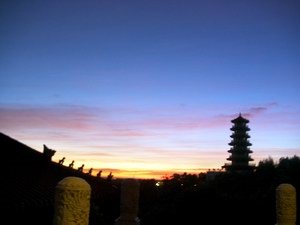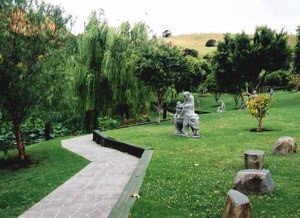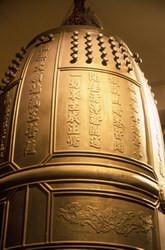To live in the present requires our mind and body to focus on what we are doing. To be aware and mindful of our physical and mental activities.
How many of us experience the art of living in the present moment? When we are walking, are we walking for walking? Or are we occupied with the thought of how long it will take us getting there? Are we enjoying every step? When we eat, are we eating for eating? Or do we want to finish quickly then rush off to the next appointment. When we are in the company of family and friends, do we listen to them attentively when they are telling us about their work, talking about their problems, schools or their friends? Or are we absent minded because we are too busy thinking about something else, thus ignoring the current moment.
Many of us have a busy life. At the end of the day when it’s time to rest, the mind refuses to relax. It dwells in things that have happened during the day, or it could be planning something for tomorrow, or worrying about the future. When the mind abides in the past or in the future, we forget about the present and these precious moments will be lost.
To live in the present moment is to make every act count. Our daily encounters can be happy or unpleasant but when we are open, we can see what they have to teach us. When we bring the mind and body together, we become conscious of our speech, conscious of our movement, conscious of our thought. All of these experiences can help us grow and enrich our lives.
Here is a story to illustrate the spirit of do it now. This happened during the Tang dynasty of China. There was a small boy who went to see a Ch’an master and requested to have his head shaved and become a novice monk. The Ch’an master told the boy to come back the following day as the day was getting late. The boy then replied he was not sure whether he would change his mind for he was very young and his will could be weak. On the other hand, he did not know whether the master would still be alive the following day because he is an old man. On hearing the boy’s remark, the Ch’an master ordained him straight away.
The art of living in the present moment is to live and embrace each moment fully, because now is the most important. Do not run away from it or go back once it’s gone. Commit one hundred percent to the present moment, until then every single event that happens in our life will be transformed to wonder.
Heaven or Hell

Ch’an master, Wu der had many disciples, whoever came to him seeking the wisdom of Ch’an would be instructed as follows:
“No personal belongings are allowed in the monastery. Strict regulations are to be observed in the meditation hall.”
Out of his wit, the Ch’an master told them a story. Once upon a time, there was a lazy person who passed away, his spirit wandered aimlessly and arrived at a place, and the owner asked this lazy being,
“Do you like eating? There is plenty of food here, you can eat as much as you like.”
“Do you like sleeping? You can sleep as long as you like and no one will ever disturb you.”
“Do you like entertainment? There’s a lot of entertainment facility you can be amused with.”
“Do you hate work? I can assure you that you don’t need to work at all and no one will ever say anything against you.”
This offer was too good to be true so he decided to stay. He spent his time indulging in eating, sleeping and playing. This went on for three months. Then, one day when he saw the owner and he made a request,
“Can you give me something to do, because everyday I spend my time eating, entertaining and sleeping. Life is meaningless this way. I’m bored. By eating too much I’ve put on weight. Please give me something to do.”
The owner replied, “I’m sorry, there is no work available.”
Another three months have passed, the lazy being couldn’t stand it any longer and said to the owner, “I can no longer endure this kind of life, if you don’t give me any work, I would rather go to hell than stay here.”
“All right,” the owner replied, “you reckon this place is heaven? You are very wrong. This is actually hell. When one has no purpose in life, when the force of creation is no longer there, the vigour of life is wasted away. This kind of life is mental torture. It’s a hundred times more unbearable than the physical.”
So what is Ch’an? What is meditation? When we embrace life with serenity, when everything occurs in our daily lives, be it small or great, we deal with the situation with grace. That’s Ch’an.
A Ch’an mind enters heaven without hindrance. Heaven or hell is just a state of mind.
The Path of Buddhism

There are many different traditions and systems, the Mahayana and the Theravada, the Pureland and the Ch’an school, there are the Tibetan, Vietnamese, Chinese, Korean, Thai and Japanese Buddhism. Out of the broad range of teachings available we may get confused with which one to choose from or we may want to take the whole lot and learn as much as we can. The main thing is to choose the one that is most suitable to us.
After the Buddha passed away, his disciple Mahakasyapa organised the First Council to compile the teachings into Sutra and Vinaya, which are the rules and regulations for the Sangha and the laity.
Over the next hundred years, Buddhism spread to other regions of India, people started to analyse the Dharma and different interpretations have given rise to some very profound philosophy such as the establishment of the Middle School, compilation of the Abhidharma and the formation of the Theravada and Mahayana schools.
When Buddhism was transmitted further abroad to South East Asia; Sri Lanka, Burma, Thailand and China. It was adapted in the local culture but transformed into new form due to geographical and psychological aspects, but the essence of the teaching remains. The principle of practice is universal.
The Buddha never told his disciples to believe what he said. Instead he encouraged them to test and confirm his teaching, to discover for themselves through direct experience, to recognise that all things are impermanent and possess the non self nature. Everything depends on one another to arise, develop and pass away. The Buddha is not aiming to explain the universe or give us lots of intellectual knowledge, his teaching guides us to have a direct experience of reality.
Learning Buddhism is learning about ourselves. We learn to develop natural mindfulness throughout the day. We watch our mind and we see how it wavers to conditional changes. We come in direct contact with our greed, anger and folly as we strive for a joyful life. A spiritual path is not reserved for monks, nuns or priests. Any person who is looking for peace and happiness can have it. It is not an escape from reality. It is an odyssey.
It is a life long journey of exploration, an adventure into heart of the heart. This journey can surprise us with many wonders while at a time breaks our ego and shatter everything to pieces, which we believe and have held onto for a long time. Spiritual awakening can be a painful process because we face ourselves directly and be honest with our limitation and defects. We need tremendous courage and strength, a kind of warrior spirit to battle the fear in opening the mind and heart. We may ask, ‘Is it worth the effort? Am I determined to exchange the deluded and happy go lucky person for so much pain? Yet it is the path to awakening.
Generosity, make good use of this quality of the heart, let it grow and expand with no hindrance.
Buddhist generosity can come in many different forms. We can be generous with our material wealth, with our time, with our skills and with our happiness.
When we talk about generosity, we are saying be generous with good intention and in a way that resonates with our values, such as integrity, compassion and wisdom.
The act of generosity deals with all aspects of life. Having generosity is a gift. It is the ability to give what we have and to give what we can. For example, doing voluntary work for the community, offering our skills in a charitable organization, words of encouragement, giving blood is also an act of generosity.
The perfection of generosity is in the opening of our heart. The practice of generosity is the freedom of letting go of holding things to ourselves. By giving, we experience tremendous joy through bringing happiness to other people’s lives.
The joy of giving is greater than the feeling of possessing anything. Generosity can transform us into a gentle and loving person. The air we breathe, the sun, water, food, the clothes we wear, the plants on the earth that support our lives, the love we get from families, the friendship we share with friends, neighbours and colleagues. All these things make us appreciate how wonderful life is.
We may ask ourselves, do we possess the possessions, or the possessions possess us? The act of giving means you’re a rich person. Giving can be an investment. The investment may take years to reach fruition or it can be instantaneous. If we contribute our generosity and kindness to society, the world will be a very pleasant and peaceful place to live. We’ll create a safer society for our children and future generations.
It’s quite ironic when we look at things from another angle, we humans are very much dominated by our emotions. We dwell in our moods even though they are causing us a lot of grief. We haven’t established the generosity of being kind to our own mind and heart. Why is that? The Buddha said it is because ignorance prevents us from seeing the true nature of everything.
Generosity if not practiced with wisdom can sometimes cause harm. The fact that it is difficult to offer help that will truly benefit others does not mean that we should not try. If our intentions are pure, there will be good results in the end. When we help someone, we must be sure that our help does not become a means for that person to bring even more trouble to themselves or others. If our generosity assists them in their wrongdoing this will bring more suffering to not only them but to others.
Generosity is carried out with wisdom when we do it with understanding and compassion. We do not make the person we help feel inferior or hurt their self esteem. We should not feel superior because we are capable of giving. Generosity is a gift to give without discrimination. It is the discovery of our own Buddha nature, the nature to give and care for all living beings with divine love.
Buddhist Hymns

Buddhist hymns are the heavenly sound of purity. According to Indian documentary record, during the life of the Buddha when King Bimbarsara was leading his men to fight a war, they saw a bhikkhu sitting by the road, his facial feature was most unattractive, but his singing was so magnificent that all his men and horses came to a halt and listened to his chanting, the words and the melody of which touched the softest part of the hearts, they closed their eyes and were immersed in peacefulness, any enmity that they had was smoothed over with love, they were moved to tears by the bhikkhu’s chanting and eventually king Bimbasara ordered his whole army to retreat and returned home.
Buddhist hymns are the sound of compassion, they open the heart and all resistances are surrendered to love and acceptance, it brings us the tranquillity and joy that comes from awareness that we are related to one another.
When Buddhism was introduced into China during the first century AD, the Buddhist hymns were also taken along, but the lyric and rhythm remained purely Indian. Prince Chu Jee who lived between 192 and 233 AD was a great poet and musician. He was inspired by the chanting and as a result he composed and wrote hymns that suit the Chinese people. Later on these hymns were further transformed into their modern day counterparts by cultivated monks who had imparted the result of their realization into this great piece of universal sound.
Who is the Ruler?
But there are bound to be problems in life. Are we going to keep running away from every problem we have or should we choose to face the problems and work them out?
We can’t really have direct control over what happens around us. We have difficulty stopping worries. We can’t control the weather, we can’t stop famine and even the richest man in the world can’t stop people dying from hunger. Sometimes when we’ve done our best, things still don’t work out the way we wanted. When we are faced with varied dissatisfactions in life how do we maintain a balanced mind?
A disciple once asked the Buddha, “Who is the ruler of the world?” The Buddha said, “one who controls the six senses is a ruler.”
The six senses are the eyes, ears, nose, tongue, touch and consciousness. As human beings we are made of body and mind or what is called the five aggregates. The five aggregates are form, which is the body, and the mind consists of consciousness, mental volition, perception and sensation.
For example, when a sound comes in contact with the ears, the consciousness becomes aware of it as a sound, our perception identifies and differentiates what kind of sound it is, then it gives rise to feeing of like or dislike. If we like it, craving starts and we want this pleasant sound to stay, if we don’t like it, we want this unpleasant sound to stop.
When we hear a compliment we feel good, when we are criticised we start to defend ourselves. Our mood fluctuates according to outside influences. As we keep reacting to the fleeting nature of life, we seem not to be able to rest. When we sleep, our mind is occupied with thoughts such as what happened during the day or things that we have to do tomorrow.
Many things in life are beyond our control. But one thing for sure is that we can choose the way we think and the way we respond.
Here is a story to illustrate how Buddha handled insult by not responding to the situation. There was a queen who had a personal grudge against the Buddha. When the queen knew Buddha was coming to her city for almsround, she hired some people to abuse the Buddha. When the Buddha went out for alms, these villains followed the Buddha and attacked him. The Buddhas’s attendant, Ananda pleaded with the Buddha to leave town and go to another place. But the Buddha refused and said,
“In another town we might also be abused and it is not practical to run away every time one encounters problems, especially when we’ve done no wrong. It is better to solve our problems in the place they arise. I’m like an elephant in a battlefield, which patiently withstands the arrows that come from all directions. I can also patiently withstand the abuses that come from other people.”
In this story, the Buddha accepted insult with an open heart. The abuse was like falling leaves that touch him lightly and then fell to the ground. Patience under abuse is the most difficult thing to practice. Our responses can be many, but they are all based on the reaction to protect the ‘self’, the ‘I’ when it is stimulated and attacked from outside.
